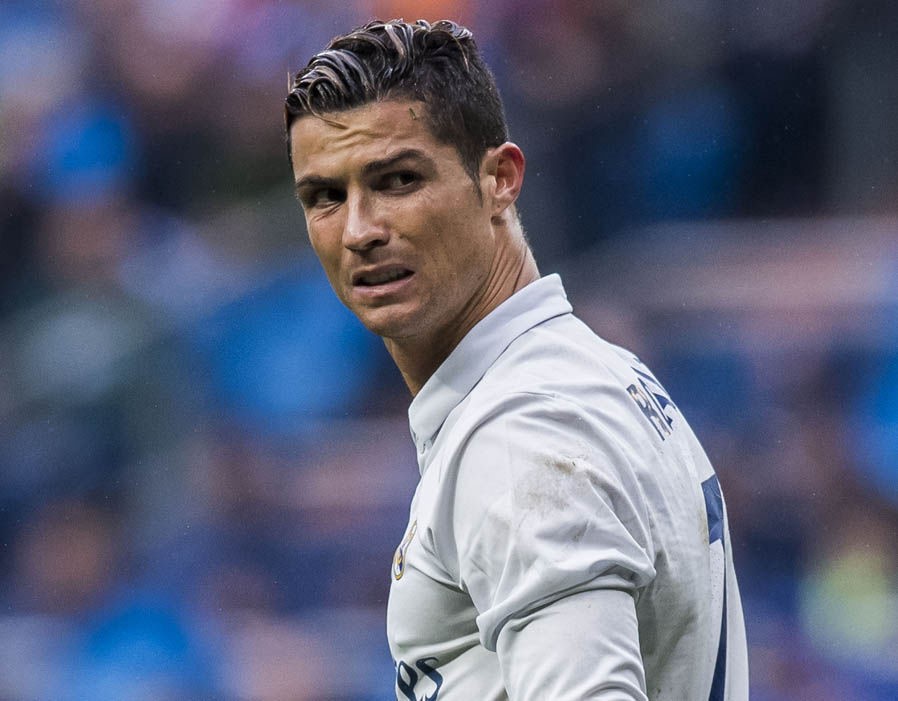When an 18-year-old endures a difficult spell, it is regarded as at best a learning curve – an experience for which the player will become stronger in the long run – or at it’s absolute worst, simply poor form.
When a 33-year-old endures a difficult spell, the response is very different. Poor form is no longer simply poor form, but something more symptomatic: an invitation to ask whether that player is edging past the peak of their powers.
Cristiano Ronaldo is a case in point. When he first arrived at Manchester United 15 years ago, he brought with him bags of skill and potential but also flaws. He was a weedy kid who would sometimes try more stepovers than the situation necessitated and – as hard as it might be to imagine now – he considered heading the ball to be a defensive art, almost beneath the more gifted players like him.
Back then though, the Portuguese wizard was not only surrounded by a core of strong Carrington characters, he was also given the time improve on his weaknesses to become the ultimate team player.
A decade and a half on, Ronaldo now has the weight of expectation on his shoulders and any sign of weakness is seized upon as a potential cue for a move to China or the MLS. There is some justification for the criticism, of course: CR7 has scored just 11 La Liga goals this season, fewer than Cristhian Stuani and Iago Aspas, who hardly set the world alight in spells with Middlesbrough and Liverpool respectively.
Of those 11 goals, two were headers: nine players have nodded in more yet none have had more headed attempts, which would indicate unusual wastefulness from a player often known for his aerial bombardment. We once used to associate with him powerful dribbling in from the left; now as many as 59 players average more dribbles per game than his 1.1. For supposedly the star man of a team chasing a third consecutive European crown – which Real Madrid are 6/1 with Betway to achieve – that output is not ideal.
The statistical decline gives media outlets the perfect opportunity to scrutinize his performances. Not only is there evidence to suggest Ronaldo isn’t at his peak, any title that implies criticism of him is likely to draw the public eye. While abroad, up and coming players at sides like Dortmund and Napoli are largely praised, Ronaldo will never escape questioning for bad performances.
It was vitally important therefore that the five-time Ballon d’Or winner provided a reminder of his capabilities on the big stage. In a vital Champions League last-16 thriller with Paris Saint-German on Wednesday night, he netted twice in the second half as Real Madrid secured a 3-1 first leg lead.
After an aggressive first 15-minutes of man-orientated pressing from Los Blancos, their position was for long spells in doubt. Neymar, who is threatening to steal Ronaldo’s pedestal as one of the globe’s top two footballers, was PSG’s main threat. He stayed wide left to try to coax Madrid right-back Nacho away from Raphael Varane and Sergio Ramos, a move that required the likes of Luka Modric and Toni Kroos to plug the gaps.
Their defensive discipline generally helped keep Le Parisiens at bay, even if Adrien Rabiot netted the opener just after the half-hour mark, but it also meant creativity for Ronaldo was limited. He netted from the spot with trademark power and accuracy to level the scores before the interval, but PSG still had their moments in the second half.
What truly changed the game in Real Madrid’s and their star man’s favour was the substitutions from both managers. Forward Edinson Cavani, who created the opener and was a willing runner throughout, was taken off for defender Thomas Meunier with a quarter of the game to go by Unai Emery, who also left it too late to bring on Julian Draxler.
By contrast, Zinedine Zidane was brave. The Frenchman took off his compatriot, an underperforming Karim Benzema for Gareth Bale, then later added Lucas Vazquez and Marco Asensio to the equation.
The latter’s work down the left contributed to the last two goals, the first of which Ronaldo poked home before Marcelo fired in a third. Crucially though, Zidane’s changes helped Real Madrid get further up the pitch and show more vibrant creativity, which was imperative in giving CR7 the support he needed.
Is Ronaldo still the man who can carry attacks on his own with raw athleticism? Perhaps not. Can he still rise to the big occasion, provide experience and a ruthless, finishing touch when needed? Absolutely.
The 33-year-old might not be the exact same player he used to be, but remains one of the best players in the world.





